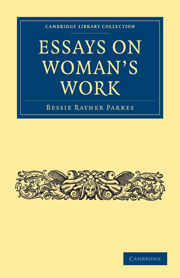Summary
IN gathering together the data afforded by the movement of the last ten years, it will be well to prefix a chapter on the reasons which have dictated the effort to improve the condition of women in our time and country. These reasons, drawn out in detail, would probably prove to be as various as the mind and characters of those engaged in the work. Questions which involve the education, employment, morals, and manners of one sex, are, of course, subordinate to those deeper philosophical and religious questions which concern the whole of humanity; and they will be judged according to the general intellectual cast, and, in great measure, according to the religious belief, of each individual. The very first point which every human being has to settle, and which every one does settle in some sort of rough way, is, what is admirable and desirable,—what is the beau-ideal for the human creature? The catechism supplies a very definite answer in regard to the end for which we were created. Nevertheless it is not one in our time universally accepted; and a great many other theories have either superseded, or so far mixed themselves up with that old-fashioned answer, as materially to change its practical effect.
Goethe, for instance, considered that self-culture and full development of the body and brain, with the decent and moderate enjoyment of all faculties of the same, constituted the beau-ideal; and Margaret Fuller Ossoli was largely influenced by his general theory of life, when she wrote of “Women in the Nineteenth Century,” though her affectionate nature redeemed its refined selfishness.
- Type
- Chapter
- Information
- Essays on Woman's Work , pp. 1 - 40Publisher: Cambridge University PressPrint publication year: 2010First published in: 1865



